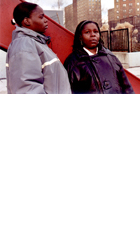
Love and Diane 2002
Distributed by Women Make Movies, 462 Broadway, New York, NY 10013; 212-925-0606
Produced by Jennifer Dworkin
Directed by Jennifer Dworkin
VHS, color, 155 min.
Sr. High - Adult
African American Studies, Social Sciences, Social Work, Sociology, Women's Studies
Date Entered: 11/09/2018
Reviewed by Mike Boedicker, Danville Public Library, IllinoisJennifer Dworkin’s debut documentary, Love and Diane, is an extraordinary piece of humanistic filmmaking about love, motherhood, family, and the convoluted workings of our social services system. Granted complete access to her subjects - indeed, she became like a member of the family - Dworkin filmed them over several years and emerges with a sprawling, complex portrait of a mother and daughter who refute the simplistic notion of the “welfare queen.” In the tradition of “direct cinema,” Love and Diane avoids talking head experts and omniscient narration, but occasionally employs subjective memory pieces narrated by the subjects themselves. Its style is opposite the aggressive, “in your face” method preferred by many contemporary documentarians, yet is ultimately more powerful.
Diane is a single African-American mother in her early 40’s living in Brooklyn. Addicted to crack cocaine in the 1980’s, she was declared an unfit mother and saw her children placed in institutions and foster homes. Diane has been clean for years and is recently reunited with her family, who are in some ways like strangers to her. She enrolls in a life skills program called Strive, determined to get off public assistance and build a career, but faces enormous challenges. She has five living children, four girls and one boy, all but one a teenager. Her oldest son committed suicide during her addiction and her youngest son disappears for days at a time. Her second daughter, Love, 18 at the film’s start, is HIV-positive and mother of a newborn boy named Donyaeh. Throughout the film we watch Donyaeh grow, and he is the story’s emotional center.
Donyaeh represents hope to Love. She gave birth to him, she tells us, “to have something in my life.” Diane bore Love and her other children for similar reasons: “The more I have the more I’ll be loved…I want to be needed.” Mother and daughter are similar in other ways. They both struggle with depression and take medication for it. And in a harrowing parallel to Diane’s past, Love is declared an unfit mother and Donyaeh is taken from her. What makes this incident even more tragic is that Diane holds herself responsible – for she is the one who reported Love to Child Services after witnessing a violent confrontation between Love and some acquaintances.
Most of the film covers Love’s attempts to reclaim her son. She hires a sympathetic lawyer, but Love’s anger and emotional problems always overpower her. She skips court-mandated therapy sessions, saying they’re too painful, thus weakening her chances for custody. Love wears T-shirts bearing such slogans as “Jesus on My Side” and “I’m a Fool for Jesus” but candidly reveals her struggles with faith. Except for weekend visits, she doesn’t see Donyaeh regularly for a year and a half. Her months without him are an emotional rollercoaster, and she quarrels with her mother constantly.
Diane and Love’s quarrels ironically contain some of the film’s most insightful moments. We witness several, each running minutes, Dworkin’s camera quietly recording, Love and Diane seemingly unaware of its presence. In the most extraordinary of these arguments, Love’s pounding criticism of her mother gradually becomes a declaration of respect and love. Love’s discussions with her lawyer are also illuminating, as when, surrounded by her problems, she blurts out in frustration “I feel like I’m my mother!” Rarely mentioned in any of these scenes, but always in the back of our minds, is Love’s HIV-positive status. For the first few months of his life, Donyaeh was thought to be HIV-positive as well, but later tests reveal him to be negative, and this revelation provides one of the few bright moments.
Love and Diane’s problems are so overwhelming the viewer might feel helpless. But fortunately there is hope. In a moving conclusion, Diane, who hasn’t seen Love in three months, successfully completes Strive and is moved to see Love at the graduation ceremony. The end credits inform us that Diane is now working as a full-time receptionist. It’s a much-deserved moment of triumph. And Love, after appealing her neglect charges, does finally gain full custody of Donyaeh. At the same time, however, Dworkin shows us how foster care enacts a toll even for those outside the biological family. In the film’s most devastating scene, Antonia Diaz, Donyaeh’s foster mother for a year and a half, tearfully packs his clothes and dresses him on her last day of custody. Wearing a shirt reading “I Love You,” she sobs as Donyaeh baby-talks what sounds like “mom.” The experience is so powerful she can’t accompany Donyaeh to his reunion with Love. Love herself acknowledges that Ms. Diaz “had him longer than I did,” and in the film’s ambiguous final shot, a subdued, yawning Love tells us she’s finally happy to have her son back but too tired to get overwhelmed by it.
At 2 ½ hours in length and covering over two years, Love and Diane is a documentary epic, the kind which makes us feel we’ve lived with the subjects and has a way of staying with us long after the credits roll. It’s never exploitative or judgmental and doesn’t attempt to answer the complex questions it raises. What Love and Diane does do is address vital issues, many of them, vividly and hauntingly and powerfully. Highly Recommended for High School, College, and General Adult audiences.